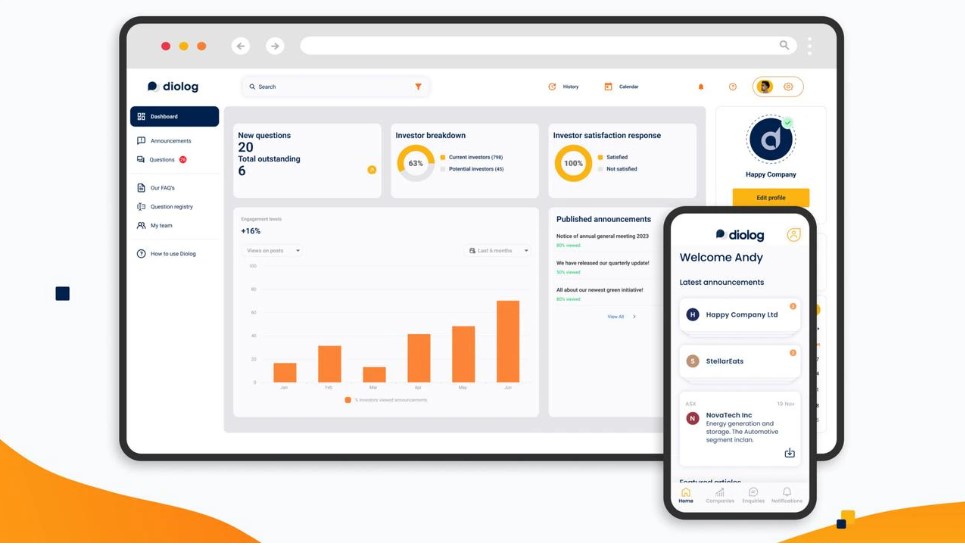Diolog is the app that wants to answer all your questions about the companies you’ve invested in

Entrepreneur Amy Benson is launching the world's first communication platform for would-be investors to quiz publicly listed companies. Image courtesy The Australian
With more than half of Australian investors declaring low to no confidence in publicly listed companies, entrepreneur Amy Benson has created what she says is the world’s first dedicated investor communications platform, Diolog, which is launching in Australia this week ahead of an international expansion.
Ms Benson, a former private equity executive, has spent the past 18 months building Diolog, which offers a free mobile app for investors to ask questions of the companies they invest in, and a web-based platform for businesses to answer questions and provide data, insight and other communications to investors.
Until now, the app has been in beta testing with publicly traded ASX companies including PlayUp, and Ms Benson said it was now primed for a hard launch.
“We’ve been testing with listed and unlisted public companies, and the response so far has been really positive, we’ve seen an increase in investor engagement across the board,” she said. “But more importantly, companies are hearing what their investors want and knowing how to keep investors happy, that’s what been more valuable.
“Some of the board members have said to us, wow, we can actually finally understand what our investors are thinking, through a fairly cost-effective, efficient tool that they can easily integrate into their everyday work.”

Ms Benson said her broad objective was to create better market communication through improved relationships between investors and businesses, and improved investor confidence. She pointed to statistics showing 97 per cent of investors have changed their investment behaviours due to declines in portfolio value – highlighting the need for improved two-way communication – while 56 per cent of local investors say they have low or no confidence in public companies.
READ MORE: Xero co-founder upbeat on ‘bigger’ start-up | Xero shares rally on outlook hopes
“Obviously, during this time of economic uncertainty, it is more important than ever for companies to ensure that their investors have confidence, because a confident investor is a valuable investor,” she said.
“And a valuable, confident investor is likely to hold on to their shares, and they likely will have a higher propensity to buy more. That also translates into having a positive impact on the company’s share price.
“If we look from the investor side of things, it’s largely about accessibility. Right now, there are many barriers – time, technology, location, information accessibility – that are all a real barrier to new investors. It is incredibly hard at the moment to be able to have that two-way communication channel.”
The Sydney-based start-up has grown into a team of seven employees, and while it has been self-funded to date, early next year the company will be looking to complete its first stage of external seed investment.
Diolog is also eyeing an expansion to Singapore and India, ahead of its longer-term vision of becoming the world’s leading two-way communication technology provider.
The company is planning to keep investor engagement high by increasing accessibility to key information that was once exclusive to biannual earnings reports and annual general meetings.
“I think what’s most surprising to me at the moment is it’s easier to buy shares than it is to communicate with the companies I invest in,” Ms Benson said.
“I think the investor relations industry has not actually evolved over time. I think it is still quite a legacy, archaic industry that does follow this pattern of one-way communication where companies are constantly told to push information out with little to no opportunity for investors to reciprocate that.
“We’re here to enhance the function and move towards building investor relationships.”
This story first appeared in The Australian as ‘Amy Benson launches ‘world-first’ investor communications platform Diolog’
David Swan is Technology Editor for The Australian. With deep experience across start-ups, business and tech David is uniquely positioned to cover Australia’s fast-growing technology ecosystem and how it’s changing how we work, live and play. David writes regular features and regularly appears on TV and radio.
UNLOCK INSIGHTS
Discover the untold stories of emerging ASX stocks.
Daily news and expert analysis, it's free to subscribe.
By proceeding, you confirm you understand that we handle personal information in accordance with our Privacy Policy.








